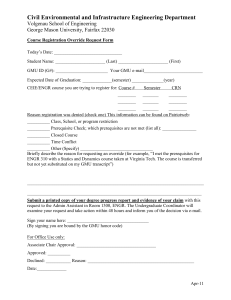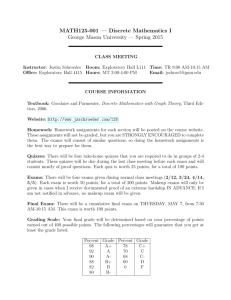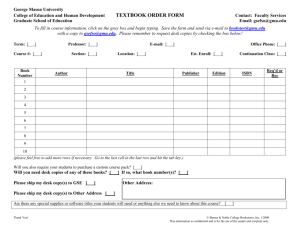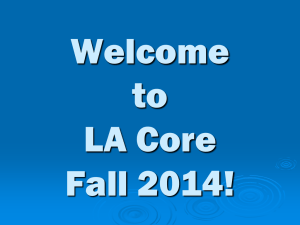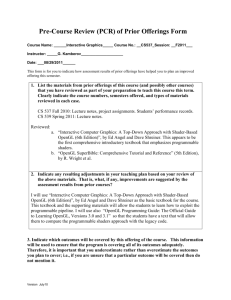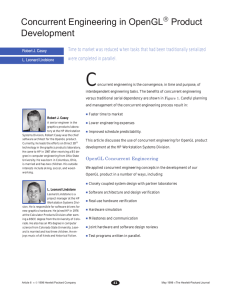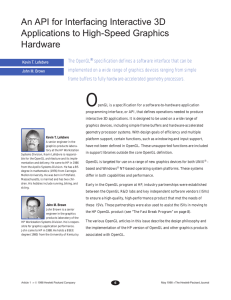CS248 - George Mason University Department of Computer Science
advertisement
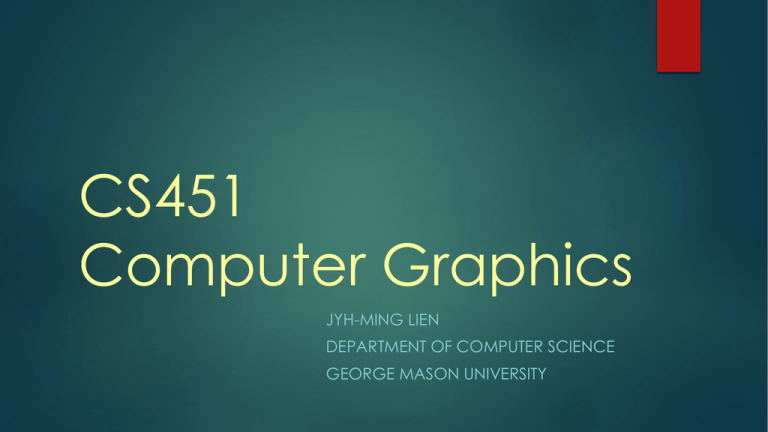
CS451 Computer Graphics JYH-MING LIEN DEPARTMENT OF COMPUTER SCIENCE GEORGE MASON UNIVERSITY What you will learn in CS451 Fundamentals of computer graphics algorithms Will give a pretty good idea of how to implement lots of the things We’ll concentrate on 3D, not 2D illustration or image processing Basics of real-time rendering and graphics hardware Basic OpenGL Not the focus, though: Means, not the end. You will get C/C++ programming experience What you will NOT learn in CS451 OpenGL and DirectX hacks Most become obsolete every 18 months anyway! Doesn’t really matter either: Graphics is becoming all software again (OpenCL, Larrabee, etc.) Software packages CAD-CAM, 3D Studio MAX, Maya Photoshop and other painting tools Artistic skills Game design What you need to know Linear algebra and trigonometry Short course – see Appendix A & B in book. C-programming How much math? Lots of simple linear algebra Get it right, it will help you a lot! Some more advanced concepts Homogeneous coordinates Quaternions for interpolating rotations/orientations Sampling, antialiasing (some gentle Fourier analysis) Monte-Carlo integration Theory of Computer Graphics You cannot do anything without it This course focuses much on the theory I won’t tell you what the calls are in OpenGL, that’s the easy part… But also on the practical aspect You have to dive into the theory and practice Look it up on the internet if you cannot understand some thing, or come ask me. Read and reread the book. Three major parts of this course Some modeling (deformation) Real-Time Rendering Performance is extremely important. Real-time is soft Try to increase the level of realism Ray Tracing and Global Illumination Higher level of realism: shadows and recursive reflections RT is the base for even more realistic algorithms (global illumination, e.g. photon mapping) Questions? Your Instructor Jyh-Ming Lien http://cs.gmu.edu/~jmlien/ jmlien@cs.gmu.edu phone: (703) 993-9546 office hour: Friday 3~5pm Your TA Le Phi Hung Email: ple13@masonlive.gmu.edu TA office hour: Wednesday & Friday 3:00pm - 4:30pm Programming assignments OpenGL basics Free-form deformation Skeleton deformation (skinning) Bump/displacement map Shading Ray tracing Ray tracing 2 (Shadow, Caustics, etc) Ambient occlusion Grading Assignments 50%: There will be around 8 programming assignments Quizzes/Mid term Exam 20% Course project 30% (individual or team project) You final grade will be A+: >= 95 points A: >= 90 points B+: >= 85 points B: >= 80 points B-: >= 75 points C+: >= 70 points C: >= 60 points D: >= 45 points F: < 45 points Final Project Can be anything 3D game Render the most realistic image you can Or come up with your own project – but you need to clear first with me Start to think about this now Will be 30% of your final grade Course Outcome Apply trigonometry, geometry, vector analysis, and linear algebra to solve real world problems. Students can develop objects transformation and their own geometric transformation mechanism as the one implemented in the OpenGL system Analyze object positions and movements to define the computing methods and solutions for multiple objects’ movements, relations, and collision activities. Students can develop methods for objects moving and colliding in 3D space Collaborate with classmates in teams in achieving the course project. Students in teams are required to identify components to be implemented and efforts to accomplish the components Understand and use the current techniques, skills, and tools in GPU programming for advanced lighting calculations Classroom Behavior During the lecture/presentation/demo, the students should not play games, text on your phone and surf the web. All electronic communication devices (including laptops, PDAs, cell phones) should be either turned off or silenced. Policies You can only have 3 late days during the entire semester, otherwise All required assignments should be completed by the stated due date and time. The total score of your score will be 10 points less every extra day after the due date (i.e., the 100 total points will become zero after 10 days pass the due date). You will be given 0 point for missing your own presentation. Please note that plagiarizing will be penalized by maximum negative credit and cheating on the exam will earn you an F in the course. See the GMU Honor Code System and Policies at http://academicintegrity.gmu.edu/honorcode and http://academic integrity.gmu.edu/honorcode. You are bound by these honor codes. Any submitted work which shows too much commonality with others' work to be completely original, or any plagiarized work, will receive a grade of 0. Any code which is presented in class or provided to you as part of the project may be included in your programs.
